翻译的过程练习(英文)
- 格式:doc
- 大小:20.00 KB
- 文档页数:1
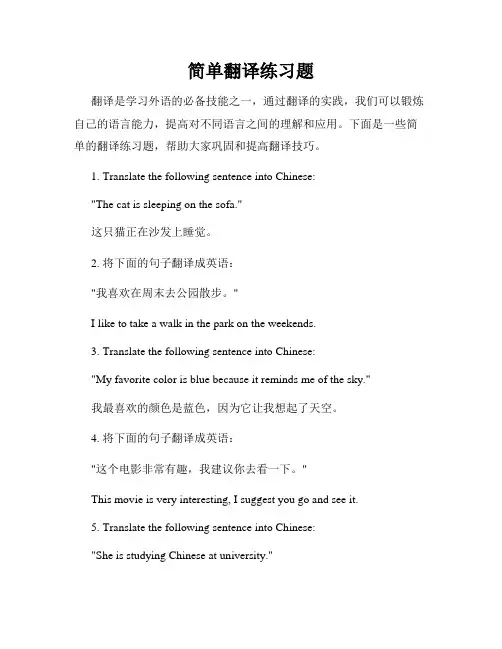
简单翻译练习题翻译是学习外语的必备技能之一,通过翻译的实践,我们可以锻炼自己的语言能力,提高对不同语言之间的理解和应用。
下面是一些简单的翻译练习题,帮助大家巩固和提高翻译技巧。
1. Translate the following sentence into Chinese:"The cat is sleeping on the sofa."这只猫正在沙发上睡觉。
2. 将下面的句子翻译成英语:"我喜欢在周末去公园散步。
"I like to take a walk in the park on the weekends.3. Translate the following sentence into Chinese:"My favorite color is blue because it reminds me of the sky."我最喜欢的颜色是蓝色,因为它让我想起了天空。
4. 将下面的句子翻译成英语:"这个电影非常有趣,我建议你去看一下。
"This movie is very interesting, I suggest you go and see it.5. Translate the following sentence into Chinese:"She is studying Chinese at university."她正在大学学习中文。
6. 将下面的句子翻译成英语:"我在周末通常和朋友们一起打篮球。
"I usually play basketball with my friends on the weekends.7. Translate the following sentence into Chinese:"Could you please pass me the salt?"请把盐递给我好吗?8. 将下面的句子翻译成英语:"那个建筑物非常古老,已经有几百年的历史了。

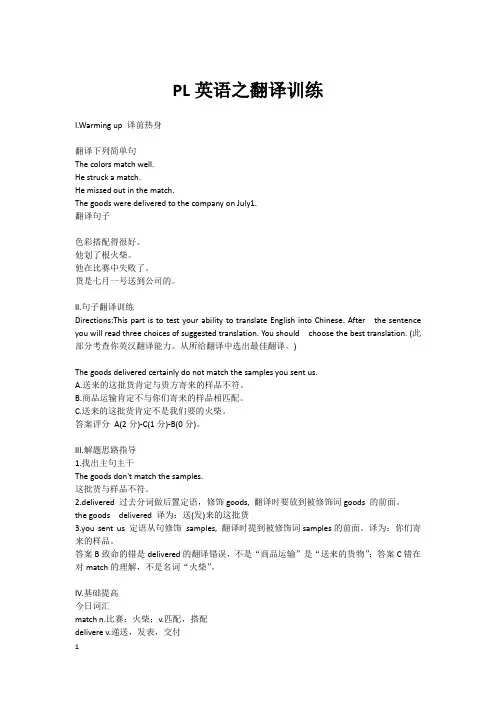
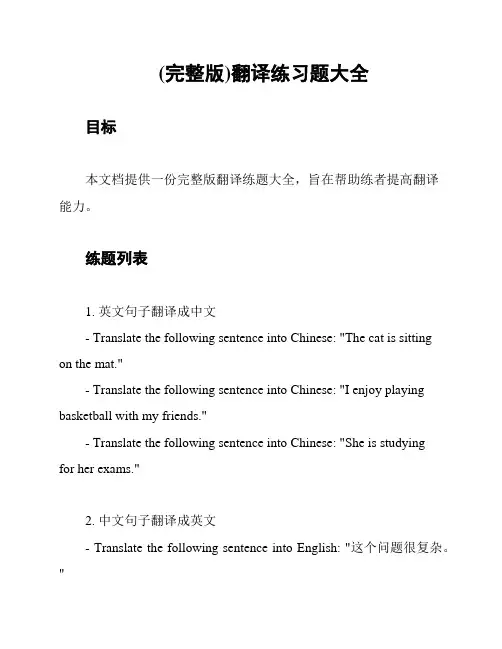
(完整版)翻译练习题大全目标本文档提供一份完整版翻译练题大全,旨在帮助练者提高翻译能力。
练题列表1. 英文句子翻译成中文- Translate the following sentence into Chinese: "The cat is sittingon the mat."- Translate the following sentence into Chinese: "I enjoy playing basketball with my friends."- Translate the following sentence into Chinese: "She is studyingfor her exams."2. 中文句子翻译成英文- Translate the following sentence into English: "这个问题很复杂。
"- Translate the following sentence into English: "我正在研究英语。
"- Translate the following sentence into English: "他们明天要去旅游。
"3. 短文翻译- Translate the following short passage into Chinese:"John and Mary are brother and sister. They live in a small house near the beach. Every summer, they go swimming in the ocean and build sandcastles on the sand. They have a lot of fun together."- Translate the following short passage into English:"李华是一个勤奋的学生。
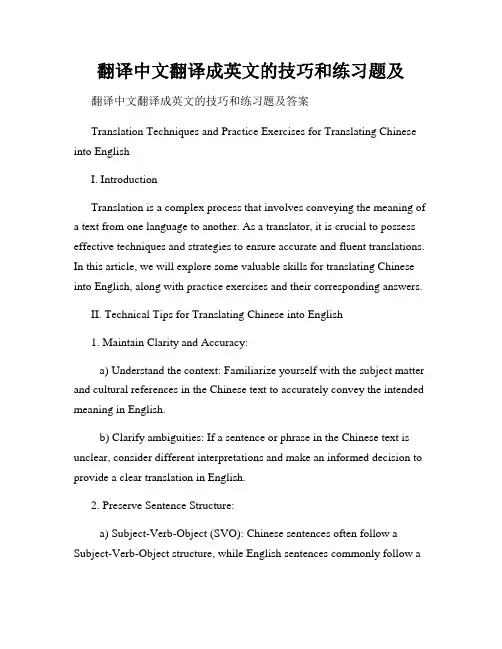
翻译中文翻译成英文的技巧和练习题及翻译中文翻译成英文的技巧和练习题及答案Translation Techniques and Practice Exercises for Translating Chinese into EnglishI. IntroductionTranslation is a complex process that involves conveying the meaning of a text from one language to another. As a translator, it is crucial to possess effective techniques and strategies to ensure accurate and fluent translations. In this article, we will explore some valuable skills for translating Chinese into English, along with practice exercises and their corresponding answers.II. Technical Tips for Translating Chinese into English1. Maintain Clarity and Accuracy:a) Understand the context: Familiarize yourself with the subject matter and cultural references in the Chinese text to accurately convey the intended meaning in English.b) Clarify ambiguities: If a sentence or phrase in the Chinese text is unclear, consider different interpretations and make an informed decision to provide a clear translation in English.2. Preserve Sentence Structure:a) Subject-Verb-Object (SVO): Chinese sentences often follow a Subject-Verb-Object structure, while English sentences commonly follow aSubject-Object-Verb (SOV) structure. Ensure the sentence structure is adjusted accordingly during translation.b) Connectors and transitions: Chinese language utilizes connectors and transitions differently than English. Pay attention to conjunctions, prepositions, and transitional words while maintaining the coherence and fluency of the translated text.3. Be Mindful of Cultural Differences:a) Idioms and proverbs: Understand the cultural meaning behind Chinese idioms and proverbs and strive to find equivalent expressions in English to maintain the intended message.b) Cultural references: Chinese texts often refer to specific events, figures, or traditions. Adapt these cultural references to English equivalents that resonate with English-speaking audiences.4. Use the Correct Register and Tone:a) Formality: Determine the appropriate level of formality in the target text, considering factors such as the genre, audience, and purpose of the translation.b) Tone: Capture the tone of the original Chinese text, whether it is formal, informal, academic, or colloquial, and reflect it appropriately in English.III. Practice ExercisesExercise 1:Translate the following Chinese sentence into English: "我最喜欢的季节是春天,因为花朵盛开,阳光明媚。

英语作文汉翻英练习
English:
My favorite season is definitely autumn. I love the crisp morning air, the vibrant colors of the changing leaves, and the cozy feeling of wrapping up in a warm sweater. Autumn has a sense of nostalgia
and tranquility that I find comforting. From pumpkin spice everything to hayrides and apple picking, there are so many fun activities to enjoy during this season. I also appreciate that the cooler weather allows for long walks in the park and sipping hot drinks by the fire. Overall, autumn is a time of reflection and gratitude that I always look forward to.
Chinese:
我最喜欢的季节肯定是秋天。
我喜欢清晨清新的空气,变化叶子的鲜艳色彩,以及裹着温暖毛衣的舒适感。
秋天带有一种让我感到安慰的怀旧和宁静感。
从南瓜味的一切到观看秋天的好时机和采摘苹果,这个季节有很多有趣的活动可以享受。
我也很感激更凉爽的天气可以让我在公园散步和在火炉旁喝着热饮。
总的来说,秋天是一个我总是期待的反思和感恩的时刻。
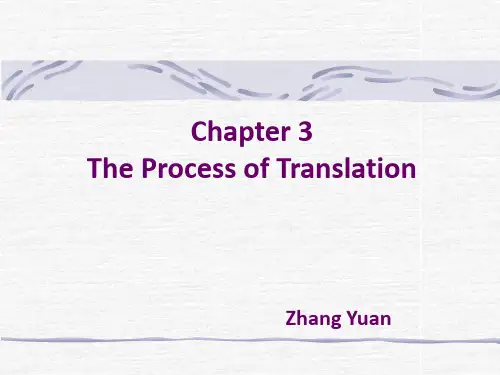
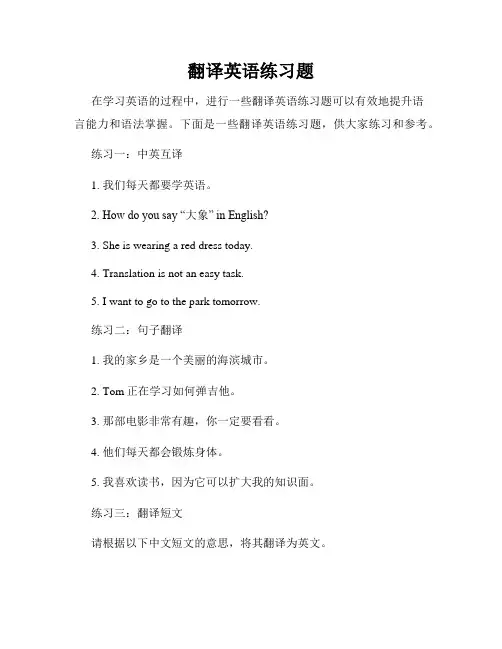
翻译英语练习题在学习英语的过程中,进行一些翻译英语练习题可以有效地提升语言能力和语法掌握。
下面是一些翻译英语练习题,供大家练习和参考。
练习一:中英互译1. 我们每天都要学英语。
2. How do you say “大象” in English?3. She is wearing a red dress today.4. Translation is not an easy task.5. I want to go to the park tomorrow.练习二:句子翻译1. 我的家乡是一个美丽的海滨城市。
2. Tom正在学习如何弹吉他。
3. 那部电影非常有趣,你一定要看看。
4. 他们每天都会锻炼身体。
5. 我喜欢读书,因为它可以扩大我的知识面。
练习三:翻译短文请根据以下中文短文的意思,将其翻译为英文。
李华是一名中国学生,他正在学习英语。
他每天都会花很多时间练习听、说、读、写。
他最喜欢读英语小说,因为通过阅读他可以了解到不同的文化和思维方式。
他也喜欢看英语电影和听英语音乐,这样可以帮助他提高听力和口语表达能力。
李华还参加了一个英语角活动,和其他外国人交流,提高自己的语言交际能力。
他相信只要坚持不懈,他的英语水平一定会提高。
练习四:句子改错请根据下列句子的中文意思,将其翻译成正确的英文。
1. 昨天我去了一家好餐厅,吃了一顿好吃的晚餐。
2. 我最好的朋友每天帮我学习英语。
3. 她们正在商量下个月去哪个国家旅行。
4. 他们希望买一台新电脑,但是他们没有足够的钱。
5. 这是我最喜欢的一本书,我已经读了三遍了。
练习五:翻译文章请将以下中文文章翻译成英文。
我是一个来自中国的学生。
我正在学习英语,希望能够流利地与其他国家的人交流。
学习英语对我来说并不容易,但是我坚持不懈地努力着。
每天,我都会听英语音乐、看英语电影、读英语小说,通过不断地接触英语,我渐渐地提高了自己的听力和阅读能力。
我还参加了英语角活动,这样我能够和其他人用英语交流,提高口语表达能力。
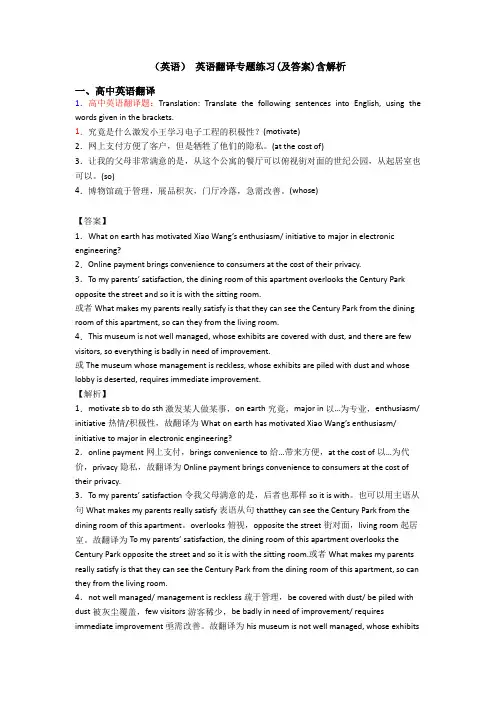
(英语)英语翻译专题练习(及答案)含解析一、高中英语翻译1.高中英语翻译题:Translation: Translate the following sentences into English, using the words given in the brackets.1.究竟是什么激发小王学习电子工程的积极性?(motivate)2.网上支付方便了客户,但是牺牲了他们的隐私。
(at the cost of)3.让我的父母非常满意的是,从这个公寓的餐厅可以俯视街对面的世纪公园,从起居室也可以。
(so)4.博物馆疏于管理,展品积灰,门厅冷落,急需改善。
(whose)【答案】1.What on earth has motivated Xiao Wang’s enthusiasm/ initiative to major in electronic engineering?2.Online payment brings convenience to consumers at the cost of their privacy.3.To my parents’ satisfaction, the dining room of this apartment overlooks the Century Park opposite the street and so it is with the sitting room.或者What makes my parents really satisfy is that they can see the Century Park from the dining room of this apartment, so can they from the living room.4.This museum is not well managed, whose exhibits are covered with dust, and there are few visitors, so everything is badly in need of improvement.或The museum whose management is reckless, whose exhibits are piled with dust and whose lobby is deserted, requires immediate improvement.【解析】1.motivate sb to do sth 激发某人做某事,on earth究竟,major in 以…为专业,enthusiasm/ initiative热情/积极性,故翻译为What on earth has motivated Xiao Wang’s enthusiasm/ initiative to major in electronic engineering?2.online payment网上支付,brings convenience to给…带来方便,at the cost of以…为代价,privacy隐私,故翻译为Online payment brings convenience to consumers at the cost of their privacy.3.To my parents’ satisfaction令我父母满意的是,后者也那样so it is with。
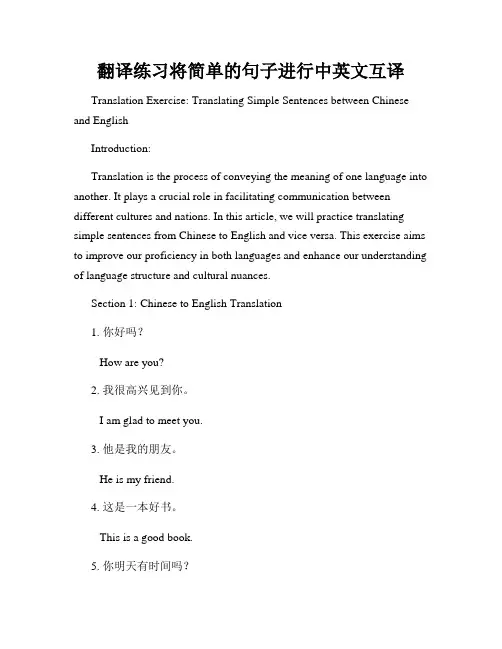
翻译练习将简单的句子进行中英文互译Translation Exercise: Translating Simple Sentences between Chinese and EnglishIntroduction:Translation is the process of conveying the meaning of one language into another. It plays a crucial role in facilitating communication between different cultures and nations. In this article, we will practice translating simple sentences from Chinese to English and vice versa. This exercise aims to improve our proficiency in both languages and enhance our understanding of language structure and cultural nuances.Section 1: Chinese to English Translation1. 你好吗?How are you?2. 我很高兴见到你。
I am glad to meet you.3. 他是我的朋友。
He is my friend.4. 这是一本好书。
This is a good book.5. 你明天有时间吗?Are you available tomorrow?Section 2: English to Chinese Translation 1. How old are you?你几岁了?2. I like to travel.我喜欢旅行。
3. Can you speak Chinese?你会说中文吗?4. Where is the nearest restroom?最近的洗手间在哪里?5. What is your favorite color?你最喜欢的颜色是什么?Section 3: Chinese to English Translation 1. 今天天气很好。
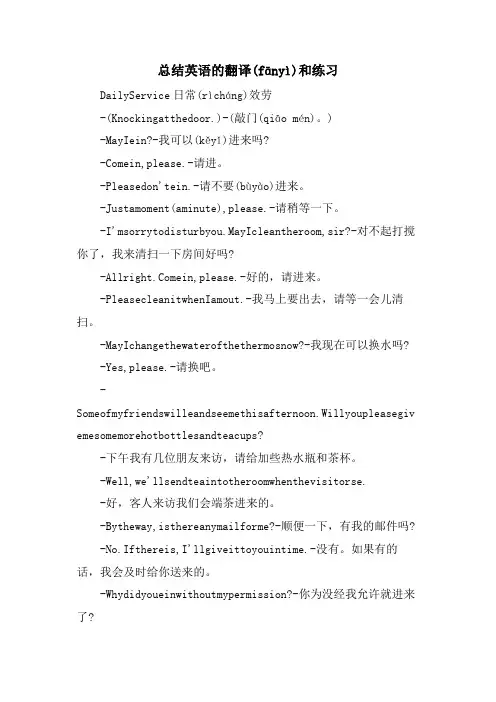
总结英语的翻译(fānyì)和练习DailyService日常(rìcháng)效劳-(Knockingatthedoor.)-(敲门(qiāo mén)。
)-MayIein?-我可以(kěyǐ)进来吗?-Comein,please.-请进。
-Pleasedon'tein.-请不要(bùyào)进来。
-Justamoment(aminute),please.-请稍等一下。
-I'msorrytodisturbyou.MayIcleantheroom,sir?-对不起打搅你了,我来清扫一下房间好吗?ein,please.-好的,请进来。
-PleasecleanitwhenIamout.-我马上要出去,请等一会儿清扫。
-MayIchangethewaterofthethermosnow?-我现在可以换水吗?-Yes,please.-请换吧。
-Someofmyfriendswilleandseemethisafternoon.Willyoupleasegiv emesomemorehotbottlesandteacups?-下午我有几位朋友来访,请给加些热水瓶和茶杯。
-Well,we'llsendteaintotheroomwhenthevisitorse.-好,客人来访我们会端茶进来的。
-Bytheway,isthereanymailforme?-顺便一下,有我的邮件吗?-No.Ifthereis,I'llgiveittoyouintime.-没有。
如果有的话,我会及时给你送来的。
-Whydidyoueinwithoutmypermission?-你为没经我允许就进来了?-It'smynegligence.Ibegyourpardon.-我疏忽(shū hu)了,请你原谅。
-Ieandmakethebed.ShallIdoitnoworlater?-我来做夜床,你看是现在(xiànzài)做还是等会儿做?-Sinceyouhavee,youmaydoitnow?-既然(jìrán)来了,现在就做吧。
翻译练习一、修改或润饰下列译文:1. A translator has to know everything of something and something of everything. 原译:翻译人员对一些事情要什么都懂,对什么事情都要懂一些。
改译:翻译人员对某些事情要全面了解,也要什么都懂一点。
2.If an information is translated well, it seems never translated at all.原译:真正的好译文就好像是没有经过翻译一样。
改译:3.Don’t do unto others what you don’t want others do unto you.原译:不要对别人做那些你不想别人对你做的事情。
改译:己所不欲勿施于人。
4.Who keeps company with the wolf will learn to howl.原译:近朱者赤,近墨者黑。
改译:5.We’d like to express our appreciation to you for all you’ve done for us in thetrade.原译:我们对于你们在这笔交易中为我们所做的一切表示由衷的感谢。
改译:对你6.We wish to advise you that the relative L/C has been established.原译:我们希望通知你们,相关信用证已经开出。
改译:7.Clear or cloudy skies may continue for the next week in the city.原译:本市下周将保持晴天或多云交错的天气。
改译:晴天或多云交错的天气讲持续到下周。
8.The stock market is expected to bottom out at the end of this month.原译:股市可望本月末停止下跌并随即回升。
翻译练习学习将中文句子翻译成英文Translation Practice: Translating Chinese Sentences into EnglishIn today's globalized world, the ability to translate Chinese sentences into English has become increasingly important. Whether it be for academic, professional, or personal purposes, mastering this skill can open up a world of opportunities. In this article, we will explore some strategies and tips for effective translation practice.1. Understanding the ContextBefore diving into the translation process, it is crucial to fully comprehend the context of the Chinese sentences. Context includes both the specific content and the broader cultural nuances. Consider the purpose of the original Chinese text and the intended audience. This step ensures that the translated English sentences accurately convey the original meaning.2. Maintaining the EssenceWhile translating, it is essential to preserve the essence of the Chinese sentences. This means capturing the underlying meaning, tone, and style of the original text. Avoid translating merely word-for-word, as it may lead to awkward and unnatural English sentences. Instead, focus on conveying the intended message fluently in English.3. Adapting Grammar and Sentence StructureChinese and English sentence structures often differ. In Chinese, the subject often comes before the verb, while in English, the subject typically precedes the verb. Additionally, sentence structures in Chinese can be moreflexible, while English follows a more strict pattern. Adapting the grammar and sentence structure accordingly is crucial for producing clear and understandable English translations.4. Choosing Appropriate VocabularySelecting the appropriate vocabulary is crucial for effective translation. Idiomatic expressions and colloquialisms in Chinese may not have a direct equivalent in English. It is important to find suitable English words and phrases that convey the intended meaning. Utilize dictionaries, online resources, and language reference materials to expand your vocabulary for translation purposes.5. Paying Attention to Cultural NuancesCulture plays a significant role in language, and translation should always consider cultural nuances. What may be appropriate in Chinese might not be the same in English-speaking cultures. It is essential to be aware of subtleties and understand cultural connotations to ensure accurate and culturally sensitive translations.6. Iterative Process and ProofreadingTranslation is an iterative process. After completing an initial translation, it is crucial to proofread and refine it. Review the translated sentences for accuracy, coherence, and stylistic consistency. Pay attention to spelling, grammar, and punctuation to ensure the final translation is error-free.7. Practice, Practice, PracticeTranslation, like any skill, requires practice to improve. Engage in regular translation exercises using various types of Chinese texts, such as news articles, literature, or even social media posts. Practice different genres and themes to enhance your versatility in translating Chinese sentences into English.ConclusionDeveloping proficiency in translating Chinese sentences into English is a valuable skill in today's interconnected world. By understanding context, maintaining the essence, adapting grammar and vocabulary, considering cultural nuances, and engaging in regular practice, one can become an adept translator. Embrace the challenges and opportunities that translation presents, as it allows for effective cross-cultural communication and understanding.。
翻译练习一、修改或润饰下列译文:1. A translator has to know everything of something and something of everything. 原译:翻译人员对一些事情要什么都懂,对什么事情都要懂一些。
改译:翻译人员对某些事情要全面了解,也要什么都懂一点。
2.If an information is translated well, it seems never translated at all.原译:真正的好译文就好像是没有经过翻译一样。
改译:3.Don’t do unto others what you don’t want others do unto you.原译:不要对别人做那些你不想别人对你做的事情。
改译:己所不欲勿施于人。
4.Who keeps company with the wolf will learn to howl.原译:近朱者赤,近墨者黑。
改译:5.We’d like to express our appreciation to you for all you’ve done for us in thetrade.原译:我们对于你们在这笔交易中为我们所做的一切表示由衷的感谢。
改译:对你6.We wish to advise you that the relative L/C has been established.原译:我们希望通知你们,相关信用证已经开出。
改译:7.Clear or cloudy skies may continue for the next week in the city.原译:本市下周将保持晴天或多云交错的天气。
改译:晴天或多云交错的天气讲持续到下周。
8.The stock market is expected to bottom out at the end of this month.原译:股市可望本月末停止下跌并随即回升。
翻译练习题加强你的中英文翻译能力翻译练习题:加强你的中英文翻译能力Introduction:翻译练习是提升中英文翻译能力的有效途径之一。
通过参与练习题,我们可以不断锻炼自己的翻译技巧和语言运用能力,提高准确度和流畅度。
本文将介绍一些翻译练习题,以帮助读者加强他们的中英文翻译能力。
1. 句子翻译练习(Sentence Translation Exercise)这类练习题要求将给定的中文句子翻译成英文。
通过这种练习,我们可以提升翻译的准确度和语言表达的清晰度。
以下是一个例子:中文句子:我喜欢在周末和朋友一起去公园散步。
英文翻译:I enjoy taking walks in the park with my friends on weekends.2. 文章翻译练习(Article Translation Exercise)文章翻译练习要求将整篇中文文章翻译成英文。
这类练习对于培养翻译连贯性和保持原文意义的完整性非常有帮助。
以下是一个例子:中文文章:中国有五千年的历史,是一个拥有丰富文化遗产和悠久传统的国家。
中国人民以勤劳、聪明和勇敢著称。
英文翻译:China, with a history of five thousand years, is a country with rich cultural heritage and long-standing traditions. The Chinese people are known for their hardworking, intelligent, and brave nature.3. 口语翻译练习(Spoken Translation Exercise)口语翻译练习要求将中文对话或演讲翻译成英文。
这类练习可以帮助提高我们的实时翻译能力和口头表达的流利度。
以下是一个例子:中文对话:A: 你去过北京吗?B: 是的,我去年去的。
北京非常美丽。
英文翻译:A: Have you been to Beijing? B: Yes, I went there last year. Beijing is very beautiful.4. 文化翻译练习(Cultural Translation Exercise)文化翻译练习要求将包含文化特色的中文文本翻译成英文,同时传达文化内涵和习俗。
翻译中英文翻译技巧和练习题及答案:翻译中英文翻译技巧和练习题及习题解析一、技巧一:理解原文意思翻译时,首先要准确理解原文的意思。
不仅要理解原文的词语,还要理解上下文的语境,以确保准确传达原文的含义。
例如,对于句子"A penny for your thoughts",不仅仅是字面上的意思是“你的想法一文不值”,而实际上是用来表达“请告诉我你正在想什么”的。
二、技巧二:注意语法差异英语和中文在语法结构上存在着很大的差异,因此在翻译时要特别注意语法的调整。
例如,英语中主语放在句首,而中文中主语通常放在句末。
因此,对于英语句子"The cat is sleeping on the mat"的翻译应为“猫正在垫子上睡觉”。
三、技巧三:避免直译直译通常会导致翻译结果不准确或不通顺。
在翻译过程中,要尽量避免直译,而是根据上下文和表达方式选择合适的翻译方法。
例如,对于英语句子"It's raining cats and dogs",直译为“正在下猫和狗”显然不合适,而应翻译为“下大雨”。
四、技巧四:充分运用词典和工具在翻译过程中,要充分运用词典和其他翻译工具,以帮助解决生词和难词的翻译问题。
例如,对于生词"accommodate",可以查找词典找到它的中文意思是“容纳”或“适应”,根据上下文选择合适的翻译结果。
练习题一:将以下英语句子翻译为中文:1. "I can't believe it!"2. "Don't count your chickens before they hatch."3. "Actions speak louder than words."4. "There's no place like home."练习题二:将以下中文句子翻译为英文:1. “一见钟情”2. “捧腹大笑”3. “守株待兔”4. “一箭双雕”习题解析:练习题一:1. “我简直不敢相信!”2. “别过早乐观。
中文句子翻译成英文练习逻辑推理在科技英语的句子翻译中扮演着重要角色。
下面是店铺带来的中文句子翻译成英文练习,欢迎阅读!中文句子翻译成英文练习精选1. 在日本,人们在进屋之前须脱鞋子。
(remove)In Japan, people should remove their shoes before they come inside.2. 这个问题值得讨论。
( worth)The problem is worth discussing.3. 除非我们净化我们的环境,否则人类可能将无法生存。
(clean up, survive)Unless we clean up our environment, human beings may not survive.4. 这时目前为止我所看过的最好的电影中的一部。
This is one of the best films that I have ever seen.5. 他是否能通过考试仍有待证实。
( remain )It remains to be seen whether he will pass the exam or not.6. 我宁可在家里清洁家具也不出去购物。
( rather than )I prefer to stay at home to clean the furniture rather than go out shopping.7. 你知道这花瓶是属于谁的吗? ( belong to )Do you know whom this vase belongs to?8. 她给我们食物和衣服,没有要求任何回报,这一切都让我们很感激。
(in return; which; be grateful ) She gave us food and clothes and asked for nothing in return, which made us very grateful.9. 他收到了一份礼物,难怪他那么开心。